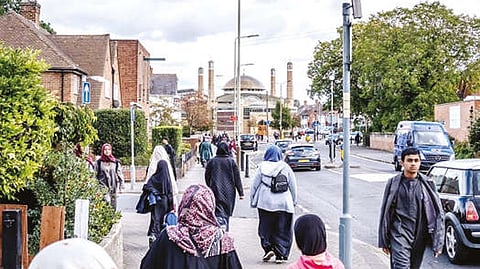

MEGAN SPECIA
In east Leicester, decorations for the Hindu celebration of Diwali hang near a sign advertising a Halal butcher. The fish shop down the road is owned by a Muslim Indian family and staffed almost exclusively by Hindus.
Everywhere, there is evidence of a diverse and sizeable South Asian community that has called this central English city home, with people from different communities and countries living side by side for decades. So it was disturbing to many residents there when crowds of mostly Hindu and Muslim men tangled with one another last month on the city’s streets, a confrontation that devolved into brawls and scuffles with the police. One group made up largely of Hindu men chanted anti-Muslim slurs as it pushed toward a mosque. In retaliation, masked men tore down flags outside a Hindu temple.
And rumour and disinformation, with lots of finger-pointing, swirled on social media, further inflaming the situation. “For me, genuinely, it was heartbreaking, it was really sad,” said Shockat Adam Patel, a Leicester resident and volunteer with MEND, a charity that fights against Islamophobia. “But it wasn’t shocking, unfortunately, because there have been quite a few incidents of friction growing.”
Experts say it is only the latest example of how the toxic politics that are roiling India — and leading to the persecution of Muslims, Christians and other religious minorities — have migrated to other parts of the globe. Across the Indian diaspora, ugly divisions are emerging. A bulldozer, which has become a symbol of oppression against India’s Muslim minority, was rolled down a street in a New Jersey town during a parade this summer, offending many people. Last year, attacks on Sikh men in Australia were linked to extremist nationalist ideology. In April, Canadian academics told CBC News that they faced death threats over their criticism of growing Hindu nationalism and violence against minorities in India.
Prime Minister Narendra Modi has largely responded to this violence with silence, which experts say his most extreme supporters interpret as a tacit sign of approval. Pratap Bhanu Mehta, a prominent Indian public intellectual, last month wrote that the Leicester episode followed a playbook “familiar for anyone who knows Indian riots: The use of rumours, groups from outside the local community, and marches to create polarisation in otherwise peaceful communities.”
The tensions that spilled onto the streets last month have prompted soul searching among the different religious communities in Leicester, a city of about 368,000 in England’s Midlands. Leicester has one of Britain’s highest proportions of South Asians, a vast majority of them people of Indian heritage, who make up some 22.3 percent of the city’s overall population, according to the most recent government statistics.
Leicester is 13 percent Muslim and 12.3 percent Hindu, and most of the people from both religious groups are ethnically Indian. “Leicester has always been proud of the fact that we have new people coming from all parts of the world,” said Rita Patel, a local councillor and member of a South Asian women’s collective working toward peace-building.
Amir Ahmed, a lawyer who was born and raised in Leicester and who volunteers with Muslim youth, said Leicester had long been seen as “a sort of poster child for multiculturalism.” But the nervousness is still palpable, and he worries that it could taint Leicester’s harmonious image. For now, community and faith leaders in Leicester and across Britain want to ensure that this kind of violence does not happen again.
Megan is a correspondent with
NYT©2022
The New York Times
Visit news.dtnext.in to explore our interactive epaper!
Download the DT Next app for more exciting features!
Click here for iOS
Click here for Android